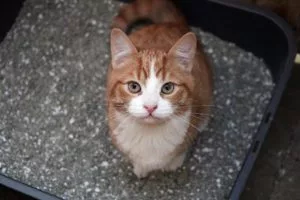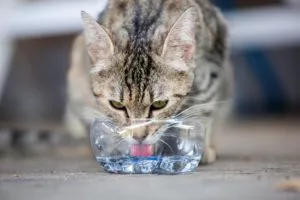My Cat Won’t Pee: When Should I Be Worried?
Realizing that your cat has not relieved themselves in some time is naturally very concerning. Unfortunately, this is usually a sign that something is wrong with your cat and they need to go to the vet as soon as possible.
Most of the time a cat not peeing is a sign that they have a problem such as an obstruction or a urinary tract infection. In some cases though this can also be a sign of a much more severe problem. As a result, cat owners should always make an appointment with their veterinarian if their cat is not urinating as often as they should be.
In this article we will be describing all of the causes for infrequent urination in cats. In addition to this, we will also be generally describing how these conditions are normally treated by a veterinarian. Let’s get right into it!

5 Possible Causes For Infrequent Urination In Cats
There are about five possible causes for infrequent urination in cats. Possibly the most common causes for this problem in cats are urinary tract infections and urinary obstructions. However, infrequent urination can also sometimes be caused by more serious conditions like kidney disease, idiopathic cystitis, and even cancer in some extreme cases. Here are the five reasons why your cat is not peeing as often as they should be.
Urinary Infections
Urinary infections occur as a result of a bacterial infection somewhere in a cat’s urinary tract. This can include the urinary tubes, bladder, and even the kidneys. Like in humans, urinary tract infections are easily diagnosed through a urine sample and treated with antibiotics. Here are some common symptoms of urinary tract infections in cats.
- Frequent urination or infrequent urination
- Straining to pee
- Only small amounts of urine when a cat does pee
- Having accidents and urinating outside of their litter box
- Lethargy
- Vomiting
The occasional UTI in a cat is not too serious, and there is usually nothing that cat owners need to worry too much about once the condition is treated. However, chronic urinary tract infections in cats can sometimes be a sign of a more serious issue.
Urinary Obstruction
Urinary obstruction is another common cause for infrequent urination in cats. Most of the time this condition is caused by kidney stones or crystals accumulating in a cat’s urinary tract. However, urinary obstruction in cats can also be a result of other conditions such as prostate disease or urinary disease. Here are some common symptoms of a urinary obstruction in cats other than infrequent urination.
- Straining to urinate
- Showing signs of pain when urinating
- Cloudy, dark, or bloody urine
- Lethargy
- Vomiting
Although a urinary obstruction is not necessarily very uncommon in cats, it is a very serious condition that requires treatment from a veterinarian immediately. Once your cat has been diagnosed with a urinary obstruction then they will likely need to go into an emergency surgery to remove the cause of the obstruction.
Cat Kidney Disease
In some cases not urinating can also be a sign of kidney disease in cats. This condition can be tricky for cat owners to notice because oftentimes the symptoms are fairly mild until it progresses into being very severe. In some cases kidney disease can be present in cats since birth, and other times kidney disease is the result of an injury, toxin, or the result of another medical condition that has not been treated.
No matter what the cause of kidney disease may be, the condition is very serious and should be promptly treated by a vet. Although not every cat will necessarily show extreme signs of kidney disease, there are some symptoms of this condition that cat owners can look out for. These symptoms include:
- Changes in urination (either more infrequent or frequent)
- Increased thirst
- Reduced appetite and weight loss (often subtle)
- Vomiting
- Lethargy
- Sleeping more often
- Not grooming themselves as often
- Pale gums and bad smelling breath
- Extended abdomen
- Bloody urine
Kidney disease can quickly become life threatening in cats if left untreated. As a result, it is always best to take your cat to the vet as soon as you can if you suspect that they have kidney disease or another problem that affects your cat’s kidneys.
Idiopathic Cystitis
This condition occurs when a cat has an inflamed bladder with no known cause. It has many similar symptoms to other urinary tract conditions that occur in cats such as a urinary obstruction or urinary tract infection. Here are the symptoms of idiopathic cystitis in cats that cat owners should be aware of.
- Infrequent urination or frequent urination where little urine is present
- Straining to urinate
- Showing signs of pain when urinating
- Bloody or dark urine
- Urinating outside of their litter box
This condition is easily diagnosed by a veterinarian, but treating the condition can be a bit more tricky. Considering that this condition can be very uncomfortable or painful for cats, your vet will likely prescribe some pain medication to put your cat at ease. If this condition has frequent flare ups in your cat, your vet may also prescribe some other medications to help manage the condition.
Cat Cancer
Some types of cancer can exhibit signs of urinary problems if it is located in or around a cat’s urinary tract. This can occur as a result of a tumor obstructing a cat’s urinary tract or cancer affecting the urinary tract directly. Symptoms of cancer can mimic other, more common conditions when it comes to their symptoms, and sometimes cats do not really exhibit any severe symptoms of cancer at all. This is yet another reason why taking your cat to the vet for urinary issues quickly is so important.
Preventing Urinary Tract Problems In Cats
There are some things that cat owners can do to prevent some of the urinary tract issues that we have mentioned in this article. Here are some things that veterinarians suggest that cat owners do to promote good urinary health in their cats.
- Keep your cat’s litter box clean
- Clean their blankets and bedding
- Feed your cat a good quality cat food
- Always provide your cat with clean drinking water

